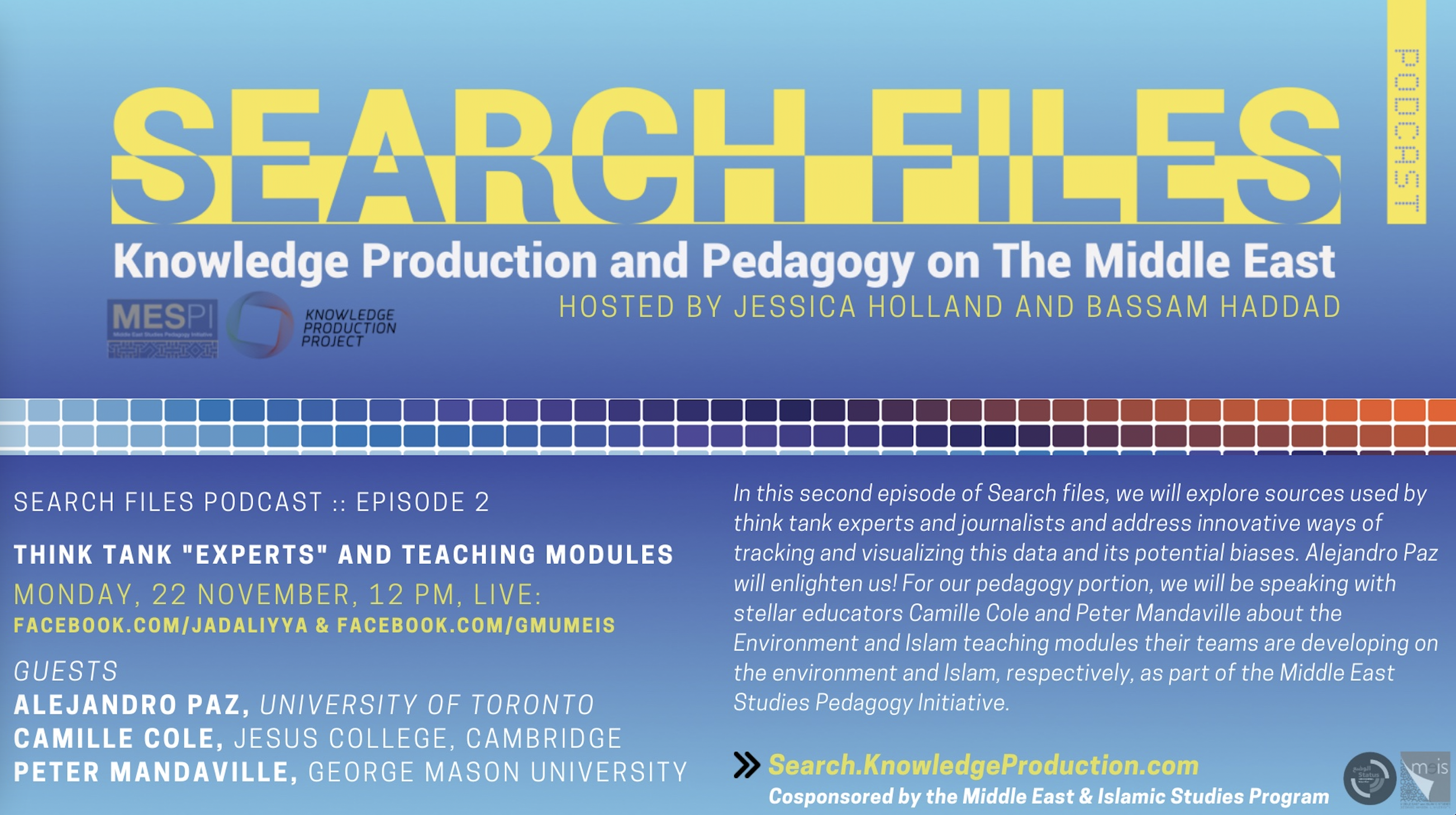Search Files Podcast: Knowledge Production and Pedagogy on the Middle East
Hosted by Jessica Holland and Bassam Haddad
Episode 2
Think Tank "Experts" and Teaching Modules
Monday, 22 September 2021
12:00 PM EST
Featuring
Alejandro Paz, University of Toronto
Camille Cole, Jesus College, Cambridge
Peter Mandaville, George Mason University
Search.KnowledgeProduction.com
MESPI.org
Cosponsored by the Middle East & Islamic Studies Program, GMU
In this second episode of Search Files, we will explore sources used by think tank experts and journalists and address innovative ways of tracking and visualizing this data and its potential biases. Alejandro Paz will enlighten us! For our pedagogy portion, we will be speaking with stellar educators Camille Cole and Peter Mandaville about MESPI’s Environment and Islam Teaching Modules their teams are developing on the environment and Islam, respectively, as part of the Middle East Studies Pedagogy Initiative.
Guests
Alejandro Paz is an Associate Professor of Anthropology at the University of Toronto Scarborough, and he has written about the politics of migration, language and citizenship in Israel/Palestine, as well as settlement in occupied East Jerusalem. His book Latinos in Israel: Language and Unexpected Citizenship (Indiana UP) was published in 2018. His current research is about Israeli English online journalism, and its impact on North Atlantic public opinion.
Peter Mandaville is Professor of International Affairs in the Schar School of Policy and Government at George Mason University. From 2015-2016 he served as Senior Adviser in the Secretary of State’s Office of Religion & Global Affairs at the U.S. Department of State where he led that office’s work on ISIS and sectarian conflict in the Middle East. From 2011-12 he served as a member of former Secretary of State Hillary Clinton’s Policy Planning Staff where he helped to shape the U.S. response to the Arab Uprisings. He is the author of the books Islam & Politics (Third Edition, 2020) and Transnational Muslim Politics: Reimagining the Umma (2001) as well as many journal articles, book chapters, and op-ed/commentary pieces in outlets such as the International Herald Tribune, The Guardian, The Atlantic and Foreign Policy. He has testified multiple times before the U.S. Congress on topics including political Islam and human rights in the Middle East.
Camille Cole is a Junior Research Fellow at Jesus College, University of Cambridge, and a historian of the modern Middle East, focusing on the late Ottoman Empire. Her current research explores how local elites shaped the emergence of capitalism and modern state practice in the Persian Gulf port city of Basra. Another project addresses the intellectual and environmental history of the concession across Latin America and the Middle East. Previously, she worked on infrastructure and development projects in Iraq and Iran.
Hosts
Jessica Holland is the Manager of Knowledge Production and Pedagogy at the Forum on Arab and Muslim Affairs, part of the Arab Studies Institute. Jessica is also co-curator of the upcoming exhibition “Geographies of the Future: Traveling the Arab World in Virtual Reality (2024). Jessica was formerly the project co-lead for a digitization and online education project, the ACOR Digital Archive in Amman, Jordan. Jessica gained an MA with distinction in Middle Eastern Studies and Arabic from SOAS, University of London, in 2018. She presented her dissertation on decolonial ‘affordances’ within the digital archive to peers at Photo Archives VII conference, organized by NYU Dhabi Institut in Florence (2019). Jessica received her BA in History of Art from the University of Cambridge in 2013.
Bassam Haddad is Director of the Middle East and Islamic Studies Program and Associate Professor at the Schar School of Policy and Government at George Mason University. He is the author of Business Networks in Syria: The Political Economy of Authoritarian Resilience (Stanford University Press, 2011) and co-editor of A Critical Political Economy of the Middle East (Stanford University Press, 2021). Bassam is Co-Founder/Editor of Jadaliyya Ezine and Executive Director of the Arab Studies Institute. He serves as Founding Editor of the Arab Studies Journal and the Knowledge Production Project. He is co-producer/director of the award-winning documentary film, About Baghdad, and director of the acclaimed series Arabs and Terrorism. Bassam serves on the Board of the Arab Council for the Social Sciences and is Executive Producer of Status Audio Magazine and Director of the Middle East Studies Pedagogy Initiative (MESPI). He received MESA's Jere L. Bacharach Service Award in 2017 for his service to the profession. Currently, Bassam is working on his second Syria book titled Understanding The Syrian Tragedy: Regime, Opposition, Outsiders (forthcoming, Stanford University Press).

